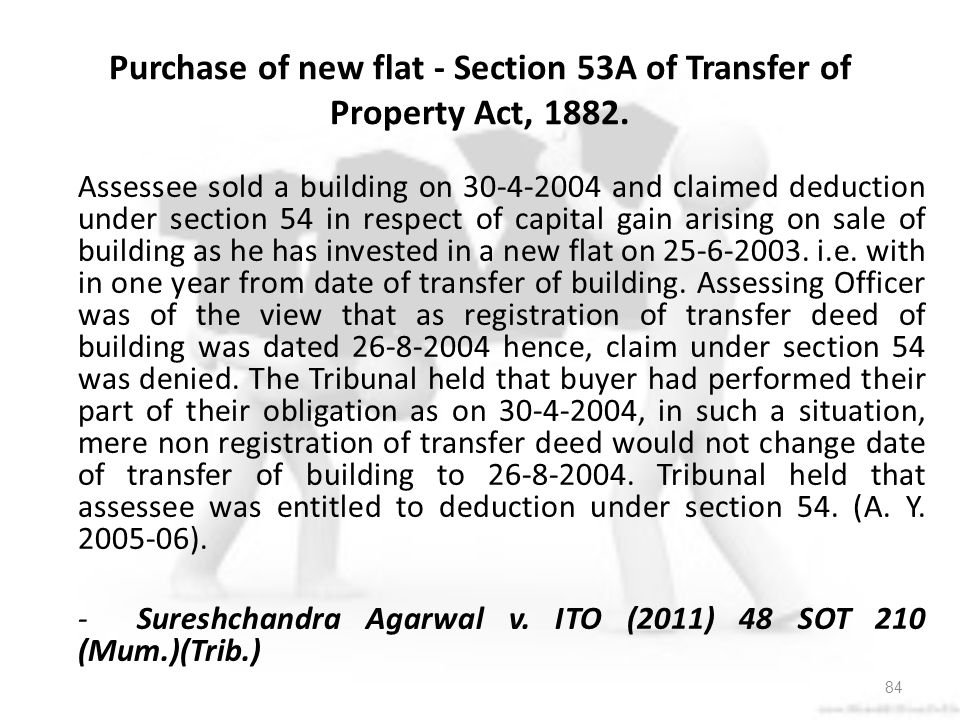Analyzing the Advance Received Against the Sale of Land by Section 2(47)(v) and Section 53A

Assessee sold a building on and claimed deduction under section 54 in respect of capital gain arising on sale of building as he has invested in a new flat on i.e. with in one year from date of transfer of building. Assessing Officer was of the view that as registration of transfer deed of building was dated hence, claim under section 54 was denied. The Tribunal held that buyer had performed their part of their obligation as on , in such a situation, mere non registration of transfer deed would not change date of transfer of building to Tribunal held that assessee was entitled to deduction under section 54. (A. Y ). - Sureshchandra Agarwal v. ITO (2011) 48 SOT 210 (Mum.)(Trib.)
At any point in your life you may be involved in selling or buying or transferring an immovable property like land, or house or such, then you must be aware of the rules and regulations imposed by the government of India on such transactions. There are several clauses that come attached to it and all are mentioned in the Transfer of Property Act, 1882. The Transfer of Property Act came into effect in 1882 under the British era, but after independence, it was extended to the whole of Union of India. One specific condition in transferring of land that this Act deals with is advance received in the sale of land, and it has been discussed in details below.
The concept of the advance received against the sale of land cannot be taxable and it can be understood by two specific sections of two different Acts. The twin condition by which the written agreement is executed and the possession is handed over has to be cumulatively satisfied. Then only the case can be brought under the Section 2(47)(v) of the Income Tax Act, 1961 and the Section 53A of the Transfer of Property Act, 1882.
Section 2(47)(v) of the Income Tax Act
Section 2(47)(v) of the Income Tax Act, defines the term “transfer” legally as, any transaction involving the allowing of the possession of any immovable property to be taken or retained in part performance of a contract of the nature referred to in Section 53A of the Transfer of Property Act, 1882.
Thus, all transactions in which the possession of an immovable property is handed over to the transferee will not be covered under Section 2(47)(v) of the Income Tax Act. The transactions which comply with the provisions of Section 53A of the Transfer of Property Act will be considered as transactions.

Section 53A of the Transfer of Property Act
The Section 53A of the Transfer of Property Act, 1882, mentions the provisions that describe situations where under a contract for the transfer of immovable property, the purchaser has paid the price and has taken possession of the property even though the transfer deed or conveyance has not been registered. In such cases, the transferor is debarred from agitating his title to the property against the purchaser.
Conditions under Section 53A of the Transfer of Property Act
The following conditions should be complied under the Section 53A
- The presence of a written contract and signed by the transferor is mandatory
- The contract is for transfer of immovable property and hence, the terms that are necessary to constitute the transfer should be established thoroughly
- The property should be in possession of the transferred who must do something for the furtherance of the contract
- The transferee should be ready and willing to do his/her part in the contract
- The transferee acquires the right in the property, in this case, even without the execution of the sales deed, and the transferor has no claim of right in respect of the property, other than the rights expressed in the terms of the contract.


 ITAT Amritsar: No Section 269SS Violation for One-Time Cash Payment Before Sub-Registrar
ITAT Amritsar: No Section 269SS Violation for One-Time Cash Payment Before Sub-Registrar  Tax Officials Unleash Digital Dragnet: How New Raid Powers Redefine Privacy, Property Rights in India and likely to Fuel Corruption
Tax Officials Unleash Digital Dragnet: How New Raid Powers Redefine Privacy, Property Rights in India and likely to Fuel Corruption  Income Tax Department Rewards for Reporting Tax Evasion: A Comprehensive Guide
Income Tax Department Rewards for Reporting Tax Evasion: A Comprehensive Guide  Forfeiture of Gratuity by Employer- What are the Remedies for an employee- Can employer be challenged?
Forfeiture of Gratuity by Employer- What are the Remedies for an employee- Can employer be challenged?  Employer can forfeit gratuity of an employee in case of moral turpitude
Employer can forfeit gratuity of an employee in case of moral turpitude  Diving Deeper: The Impact of the New Tax Bill on Dairy and Farming Income
Diving Deeper: The Impact of the New Tax Bill on Dairy and Farming Income